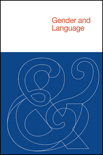
Gender and Language
Scope & Guideline
Bridging Gender Studies and Linguistics for a Deeper Understanding
Introduction
Aims and Scopes
- Language and Gender Studies:
The journal focuses on the intersection of language and gender, examining how linguistic practices reflect and construct gender identities. It includes studies on gendered language use, the representation of gender in media, and the implications of language for gender equality. - Queer Linguistics:
A significant area of interest is queer linguistics, which explores how language is used within LGBTQ+ communities. This includes the analysis of queer discourse, identity formation, and the impact of language on social movements related to gender and sexuality. - Sociolinguistics of Gender and Sexuality:
The journal emphasizes sociolinguistic perspectives, investigating how language varies across different social groups and contexts, particularly in relation to gender and sexuality. This includes studies on language change, identity, and the social meanings attached to linguistic choices. - Critical Discourse Analysis:
Research published in the journal often employs critical discourse analysis to uncover how language perpetuates power dynamics related to gender and sexuality. This methodology is used to analyze media representations, political discourse, and social movements. - Intersectionality:
The journal promotes an intersectional approach to language, gender, and sexuality, encouraging studies that consider how various social categories (such as race, class, and sexuality) intersect and impact language use and identity.
Trending and Emerging
- Non-binary and Fluid Gender Identities:
Recent publications highlight a significant increase in research addressing non-binary and fluid gender identities. This trend reflects broader societal changes and the growing recognition of diverse gender experiences, emphasizing the need for inclusive language practices. - Language and Digital Media:
There is a notable focus on the interaction between language, gender, and digital media, particularly how social media platforms shape gendered communication. Studies explore online discourses, representation in digital spaces, and the impact of technology on gender identity. - Intersectionality in Language Studies:
The incorporation of intersectionality into language studies is increasingly prominent. Researchers are examining how overlapping identities influence language use and experiences of gender and sexuality, leading to richer analyses that account for complexity in social identities. - Activism and Language:
The journal has seen a rise in studies that connect language with activism, particularly in LGBTQ+ contexts. This includes analyses of language used in social movements, political discourse, and the role of language in advocating for gender equality and rights. - Global Perspectives on Gender and Language:
There is an emerging trend towards exploring gender and language through a global lens, focusing on non-Western contexts and diverse cultural perspectives. This shift encourages a broader understanding of how language interacts with gender across different societies.
Declining or Waning
- Traditional Gender Roles:
Research that strictly examines traditional gender roles and binary classifications of gender has seen a decline. There is a growing emphasis on non-binary and fluid gender identities, suggesting a shift towards more diverse and inclusive perspectives. - Historical Linguistic Approaches:
Papers focusing on historical or diachronic linguistic approaches to gender are becoming less common. The current trend favors contemporary analyses and empirical studies that reflect ongoing social changes rather than historical perspectives. - Static Gender Stereotypes:
Studies that reinforce static or simplistic views of gender stereotypes are waning. The journal increasingly prioritizes research that challenges these stereotypes and explores the complexities of gender identity and expression.
Similar Journals
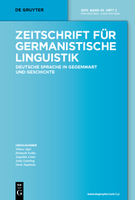
ZEITSCHRIFT FUR GERMANISTISCHE LINGUISTIK
Elevating the Discourse on German Language DynamicsZEITSCHRIFT FUR GERMANISTISCHE LINGUISTIK, published by WALTER DE GRUYTER GMBH, stands as a pivotal resource in the field of linguistics since its inception in 1973. With its ISSN 0301-3294 and E-ISSN 1613-0626, this esteemed journal serves as an essential platform for researchers and academics focused on the nuances of the German language and its linguistic frameworks. Catering to a diverse audience, the journal features high-impact articles and contributions consistent with rigorous academic standards, as evident from its Q1 categorization in Linguistics and Language and its notable rankings in both the Arts and Humanities and Social Sciences domains. The journal's commitment to advancing knowledge in linguistics fosters a scholarly environment conducive to both emerging and established linguists. While not available through open access, ZEITSCHRIFT FUR GERMANISTISCHE LINGUISTIK remains influential, drawing readers keen on exploring developmental and educational paradigms alongside linguistic theories. With a convergence of research that spans until 2024, it represents a comprehensive body of work integral to the evolving landscape of linguistic studies in Germany and beyond.
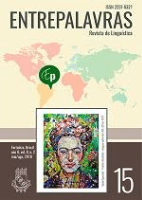
Entrepalavras
Advancing Language Studies with Collaborative InsightsEntrepalavras, an esteemed journal published by Federal University of Ceará, serves as a vital platform for scholarly discourse in the field of linguistics, language studies, and communication. Since its inception, the journal has embraced an Open Access model, promoting widespread dissemination of research findings and fostering collaboration among researchers, professionals, and students alike. With its ISSN 2237-6321 and consistent focus on contemporary linguistic issues and educational practices, Entrepalavras contributes meaningfully to the academic community, particularly in Brazil and beyond. By providing open access to valuable research, the journal aims to bridge gaps in knowledge, stimulate innovative approaches, and enhance the understanding of language dynamics in various contexts. Researchers and practitioners are encouraged to explore the wealth of insights presented in each issue and contribute to this growing body of work.

Revista Virtual de Estudos da Linguagem-ReVEL
Empowering Linguistic Research for AllRevista Virtual de Estudos da Linguagem-ReVEL is a prominent academic journal dedicated to the field of linguistics, published by REVISTA VIRTUAL ESTUDOS LINGUAGEM in Brazil. With its ISSN 1678-8931, ReVEL aims to provide a platform for scholarly communication and dissemination of research across diverse areas of language studies, including sociolinguistics, language acquisition, and discourse analysis. As an open-access journal, it fosters accessibility to important linguistic research, allowing researchers, educators, and students alike to engage with the latest findings without subscription barriers. The journal’s focus on innovative methodologies and interdisciplinary approaches makes it a valuable resource for those seeking to deepen their understanding of language dynamics in various contexts. By contributing to the growing body of knowledge in this field, ReVEL plays a crucial role in promoting scholarly dialogue and enhancing the visibility of Brazilian linguistic research on a global scale.
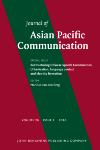
Journal of Asian Pacific Communication
Unraveling the intricate tapestry of communication across the region.The Journal of Asian Pacific Communication, published by John Benjamins Publishing Co, stands out as a vital resource for researchers and professionals exploring the intricate dynamics of communication within the Asian Pacific region. Established in 2000, this esteemed journal, with the ISSN 0957-6851 and E-ISSN 1569-9838, focuses on interdisciplinary studies that intersect with the fields of business, communication, economics, and geography, as indicated by its Q3 ranking in multiple categories for 2023. The journal facilitates scholarly discourse, making it crucial for understanding regional communication practices and their broader implications. While the journal is not Open Access, it remains a critical source of knowledge for academics, offering comprehensive insights and empirical research that can inform practice and policy. In a rapidly evolving global context, the Journal of Asian Pacific Communication is dedicated to advancing the understanding of communication complexities unique to the Asian Pacific, ensuring its pivotal role in ongoing academic discussions.
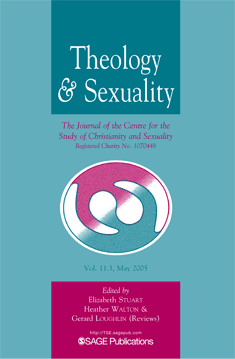
Theology & Sexuality
Illuminating the Complex Ties Between Sexuality and SpiritualityTheology & Sexuality is a pivotal journal published by Routledge Journals, Taylor & Francis Ltd that investigates the intricate relationship between theological discourse and sexual identity, sexuality, and gender. With its ISSN 1355-8358 and E-ISSN 1745-5170, the journal serves as a crucial forum for academics and practitioners alike, reflecting its commitment to advancing scholarship in both Gender Studies and Religious Studies. Operating from the United Kingdom, the journal has been a significant contributor to the field since its inception in 1996, with a publication horizon extending to 2024. Notably, it holds a rank of #211/644 in Religious Studies and #145/213 in Gender Studies according to Scopus, demonstrating its relevance in contemporary academic discourse, despite it falling within Q4 quartile rankings. The journal offers insightful analyses and interdisciplinary perspectives that are essential for understanding the complexities of faith and sexuality, making it an invaluable resource for researchers, professionals, and students dedicated to exploring these critical themes.
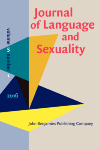
Journal of Language and Sexuality
Illuminating the Language of Sexual IdentitiesJournal of Language and Sexuality, published by John Benjamins Publishing Co, stands at the forefront of interdisciplinary research in the fields of Anthropology, Gender Studies, and Linguistics. With an ISSN of 2211-3770 and an E-ISSN of 2211-3789, this esteemed journal has quickly gained prominence, achieving a prestigious Q1 ranking in its categories as of 2023. Covering diverse topics that intersect language with sexual identity and expression, it serves as a critical platform for scholars and practitioners alike, fostering dialogue and exploration of contemporary issues surrounding language use in the context of sexuality. Despite not offering open access, the journal is indexed in Scopus, underscoring its relevance and rigorous academic standards, making it an essential resource for anyone involved in the research of language and societal constructs from 2019 through to 2024. Positioned in the Netherlands, the journal continues to cultivate a global audience keen on advancing knowledge in this vibrant area of study.
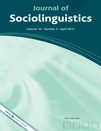
JOURNAL OF SOCIOLINGUISTICS
Fostering Critical Dialogue in Language StudiesThe Journal of Sociolinguistics, published by Wiley in the United Kingdom, is a leading interdisciplinary journal that explores the intricate relationships between language and society. With an impressive impact factor reflecting its Q1 quartile ranking in Histories and Philosophy of Science, Linguistics, Philosophy, and Sociology, this journal is recognized for its scholarly contributions, making it a vital resource for academics and practitioners in these dynamic fields. Covering a wide scope of topics from language variation and change to sociocultural dynamics, the journal has converged from 2004 to 2024, ensuring a comprehensive understanding of contemporary sociolinguistic issues. Although operating under a traditional access model, the Journal of Sociolinguistics remains pivotal for advancing critical dialogue and research for professionals, researchers, and students invested in linguistic and sociological studies.
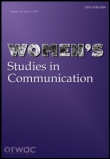
Womens Studies in Communication
Illuminating the Intersections of Gender and DialogueWomens Studies in Communication, published by Routledge Journals, Taylor & Francis Ltd, stands as a pivotal platform for scholars and practitioners in the fields of communication and gender studies. With an impressive history of publishing since 1977, this journal delves into the intricate intersections of gender and communication, fostering critical dialogue and innovative research. It currently holds a category quartile ranking of Q2 in both Communication and Gender Studies, reflecting its significant impact in these vital fields. With an ongoing commitment to exploring the nuances of women's voices and experiences in various communicative contexts, the journal provides an invaluable resource for understanding contemporary societal issues. While currently not available as an open-access publication, its adherence to high academic standards, evidenced by its Scopus rankings, making it an essential read for researchers, students, and professionals eager to enrich their understanding of gender dynamics in communication.

Linguas & Letras
Fostering Global Discourse in Linguistic and Literary ResearchLinguas & Letras is an esteemed academic journal published by UNIV ESTADUAL OESTE PARANA-UNIOESTE, dedicated to the diverse fields of linguistics and literature. With an ISSN of 1517-7238 and an E-ISSN of 1981-4755, this journal serves as a vital platform for scholars and practitioners to disseminate their research and insights. Although the journal operates under a closed access model, it actively engages a global audience of researchers, professionals, and students interested in the interplay between language and literature. With a focus on interdisciplinary studies, Linguas & Letras encourages submissions that explore innovative methodologies and theoretical frameworks. Situated in Cascavel, Paraná, Brazil, the journal aspires to contribute significantly to the academic discourse in linguistics and literary studies, making it an essential resource for anyone seeking to advance their knowledge and understanding in these dynamic fields.
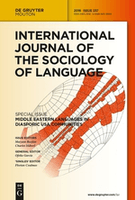
International Journal of the Sociology of Language
Advancing Sociolinguistic Insights for a Global AudienceInternational Journal of the Sociology of Language (ISSN: 0165-2516, E-ISSN: 1613-3668) is a premier academic journal published by WALTER DE GRUYTER GMBH in Germany, focusing on the intricate relationship between language and society. Since its establishment in 1974, this journal has continued to serve as a vital platform for disseminating high-quality research and theoretical discussions within the realms of linguistics and social sciences. Notably, it holds an impressive Q1 ranking in Linguistics and Language and maintains robust positions in Scopus rankings, being placed in the 84th and 83rd percentiles in the Arts and Humanities and Social Sciences categories, respectively. The journal not only emphasizes the socio-linguistic aspects of language use but also aims to foster interdisciplinary dialogue, making it indispensable for researchers, practitioners, and students pursuing an understanding of language within its social contexts. Although it is not an open-access publication, its rich content and scholarly contributions continue to have a significant impact within the field, making it a recommended read for anyone interested in the sociolinguistic landscape.